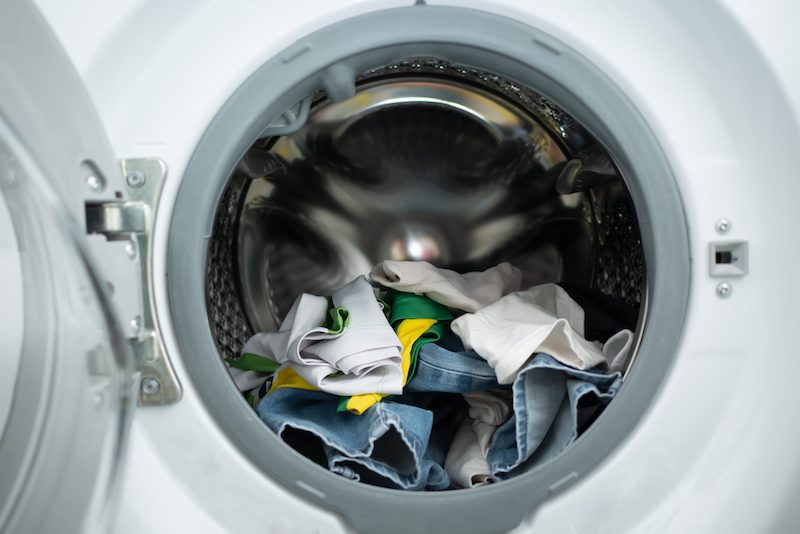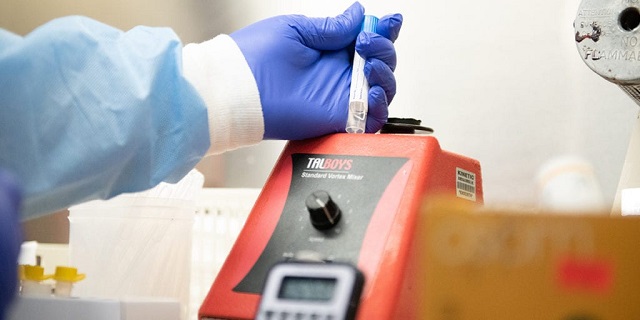How Long Does Coronavirus Last On Clothes?

August 27, 2020
Information regarding COVID-19 and vaccines are continually evolving, new details may be available since this content was developed. Please visit the CDC's website for the most up to date information.
After you return home from your weekly supermarket run, do you throw what you wore straight into the laundry machine to avoid picking up the novel coronavirus (COVID-19)? What about after you visit the barber shop? Some people feel calmer and more in control when they remove clothing that they’ve worn in public in case it was exposed to COVID-19.
However, experts believe that in many situations, it’s unlikely for viral particles to land on clothing, especially if you practice social distancing and the people you encounter wear masks. More important than focusing on your clothing is remembering to wash your hands when you return home.
When to be concerned
Not all situations are risk-free: If you lean against high-touch surfaces which may have been exposed to COVID-19, there may be more of a chance that your clothing could harbor the virus. And if you work in a health care environment where patients have COVID-19, the risk of your clothing being exposed to viral particles may increase.
Research suggests that COVID-19 doesn’t survive for long on clothing, compared to hard surfaces, and exposing the virus to heat may shorten its life. A study published in found that at room temperature, COVID-19 was detectable on fabric for up to two days, compared to seven days for plastic and metal. However, when it was exposed to high heat, the virus became inactive within five minutes.
“If you’re concerned that your clothing may have been exposed to COVID-19, the best way to get rid of the virus is to wash any exposed clothing on heated cycles,” says John Sensakovic, M.D., division director of infectious disease at JFK Medical Center.
How to launder clothing in the COVID era
If you’re washing clothing because you’re concerned that you’ve been exposed to the virus, follow these simple tips:
- place your clothing and reusable fabric masks in the washing machine when you remove them
- don’t shake out dirty clothing items, in case you release the virus into the air
- wash your clothing with the warmest water that’s allowable for those items
- consider using bleach or color-safe bleach, which may inactivate the virus, if it’s present
- place your cleaned clothing into the dryer, rather than air drying
- dry your load of laundry thoroughly in the dryer
“If you follow the entire laundering process – which includes heat, detergent and agitation during the wash and spin cycles, plus the dryer – it should remove or inactivate the virus from your clothing,” says Dr. Sensakovic.
How to launder clothing when someone in your household has COVID-19
When a family member is sick, you may need to do their laundry for them. Follow these practices:
- keep their laundry in a separate hamper, rather than combining it with family members’ clothing
- line the hamper with a disposable plastic bag before tossing in clothing
- wash the sick person’s clothing separately, following the care instructions above
- disinfect the hamper after removing the dirty clothing
- after handling the clothing, wash your hands thoroughly
- use a disinfectant wipe to clean washing machine or dryer knobs, buttons or handles, if you touch them after handling dirty laundry and before washing your hands
- clean the inside of the washing machine with bleach or a disinfectant wipe after removing the laundry
“These practices should help to limit the chances that any residual virus left in the machine could transfer to the next person’s load of laundry, “ Dr. Sensakovic says.
Next Steps and Resources
- Meet our clinical contributor: John Sensakovic, M.D.
- To make an appointment with Dr. Sensakovic or a doctor near you, call 800-822-8905 or visit our website.
The material provided through HealthU is intended to be used as general information only and should not replace the advice of your physician. Always consult your physician for individual care.
Find a doctor near me
How Does COVID-19 Affect the Heart?

COVID-19: Heart effects explained. Dr. Sharma discusses potential long-term cardiac issues and offers guidance. Learn more & get care.
How Does Soap Work?

Learn how soap removes germs. Dr. Wolaniuk explains the science behind handwashing. Improve hygiene; call 800-822-8905 for care.
Find a doctor near me

Exposed to COVID? Here’s When to Get Tested
COVID-19 exposure? Learn when to get tested. Doctors Fleischman and Cicogna offer guidance and next steps. Call 800-822-8905.

How to Prepare for a COVID Test
Prepare for your COVID-19 test. Find testing sites, learn what to bring, and avoid common mistakes. Get helpful tips for a smoother experience.

What Are COVID-19 Vaccine Side Effects, and How Long Do They Last?
Here are answers to questions that you may have about COVID-19 vaccine side effects.

What Can You Do After You’re Fully Vaccinated Against COVID?
There are advantages to getting fully vaccinated against COVID-19.
